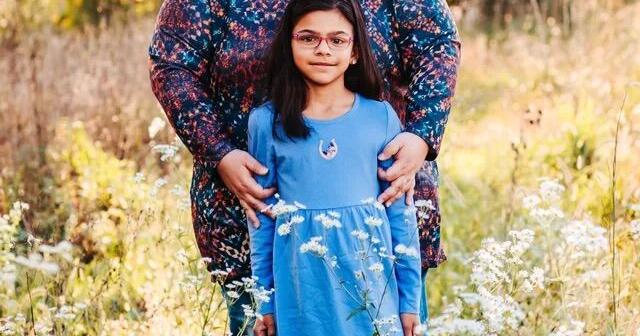Congenital disorders
OCND is a genetic condition that was recently identified
#inform-video-player-1 .inform-embed { margin-top: 10px; margin-bottom: 20px; }
#inform-video-player-2 .inform-embed { margin-top: 10px; margin-bottom: 20px; }
Hitting milestones in the early years of a child’s life is an important aspect of a child’s development.
So when Alyssa Ronco noticed that her daughter, Angeli, wan’t hitting some of those milestones, she knew challenges were likely ahead.
What she didn’t know was that it would take seven years before anyone was able to pinpoint exactly what was going on with her little girl.
“Angeli’s symptoms include global developmental delays, GI issues including reflux and constipation, learning disabilities including severe dyslexia, speech issues, hypotonia, short stature, feeding difficult from birth, and vision issues,” explained Ronco.
It’s something that has affected all aspects of their family life and has forced Ronco to look far and wide for the diagnosis that would define the assistance her child needed. A genetic test in 2015 did not provide the answers Ronco was hoping to find.
Then, in 2019, Ronco took Angeli to see Dr. Andrea Seeley, a board-certified and fellowship-trained specialist in pediatric genetics at Geisinger in Danville.
“When I met Angeli in 2019, she had already had a very thorough workup,” said Seeley. “She had been faced with ongoing health issues since birth for many things and no one was able to provide (Mom) with a diagnosis.”
Luckily, with the passage of time also came advancements in the medical field, including newer, more advanced genetic testing.
“In 2019, we then had the option to offer a newer genetic test called Exome Sequencing, which allows us to screen the entire coding region of the genetic code for variants that might cause genetic conditions,” explained Seeley.
Ronco said the test took months to complete, but it was well worth it when a diagnosis finally provided results and a diagnosis: Angeli had Okur-Chung Neurodevelopmental Syndrome (OCNDS). According to the CSNK2A1 Foundation, which is dedicated to finding a cure for OCNDS, the condition is caused by a mutation in the CSNK2A1 gene, located on Chromosome 20.
OCNDS brings with it a “huge” variation in symptoms and severity of the disease. It is a rare disease that — to date — has been diagnosed in approximately 160 individuals worldwide. The diagnosis allowed us to create a personalized health plan for Angeli, said Seeley.
“What we know is that individuals with this condition have non-specific clinical features which would ultimately delay language and motor development as well as intellectual disability in the mild to moderate range,” explained Seeley. “They can also have generalized hypotonia, difficulty feeding in infancy, and, as we learn more about the condition, we know some individuals are at risk for minor eye differences, congenital heart defects, renal anomalies (kidney differences) as well as a risk for recurrent infections and sleep disorders.”
Individuals with OCNDS may have one or more of these medical issues, but they won’t necessarily have all of them. Seeley said developmental delays can affect various areas of a child’s development including, but not limited to, motor skills, language acquisition, and social interaction.
Children diagnosed with OCNDS may need more time to reach their milestones, but a diagnosis doesn’t mean they won’t.
“While children with delays may require additional support and intervention to reach these milestones, it’s important to remember that each child is unique and will progress at their own pace,” Sheeley continued.
“With early identification and appropriate interventions, children with developmental delays can still achieve significant progress and reach their milestones, albeit in their own time.”
OCNDS is not a genetic condition where there is treatment per se, explained Seeley, but understanding the medical issues individuals are at risk for allows doctors to screen for things ahead of time, “hopefully prior to them becoming a significant issue.”
“Early intervention and support definitely improves the outcome,” explained Seeley. “Earlier detection will improve the overall potential for all of these individuals and, if they have any of the other associated features (communal logic, cardiac issues that haven’t been detected yet) when we do find those, they will be less likely to have a complication from it.”
With Angeli, for example, Seeley said she knows that she is going to have to manage neuro-developmental as well as feeding issues, likely throughout her lifetime.
“However, we do know that individuals with these conditions who often require closer surveillance during childhood may not need as much, hopefully, as they reach adulthood,” said Seeley.
As for Ronco, she said getting a diagnosis after seven years was a relief, but didn’t magically make everything better. She has had to learn how to parent a child with a not-well-understood disease.
Because Angeli struggles in traditional school that doesn’t yet offer the support she requires. Ronco said, Angeli is taking classes online through a charter school in Chicago for kids with dyslexia and is making huge progress in reading and math.
“We homeschool the rest of the subjects so that I can teach her one on one,” she said.
Angeli also has hours of therapies on a weekly basis including speech, therapeutic riding, and vision therapy to help her brain and eyes work together. Ronco needed to secure the help of a feeding therapist because Angeli had no hunger sensation and very little appetite.
Sheeley continued, “We have a few patients in our clinic we follow, all of whom were discovered within the last five years,” she said.
“Not only do the families learn from us, but we learn from the families as they come back for follow ups, which allows us to help others with this condition.”
The CSNK2A1 Foundation is focused on finding a cure for OCNDS and ensuring affected individuals have the opportunities and supports necessary for happy and full lives. For more information on OCNDS visit their website.
#inform-video-player-3 .inform-embed { margin-top: 10px; margin-bottom: 20px; }

